
Nigeria is quite a big area of land. The cash crops in Nigeria are quite many and varied; and many of the plants be concentrated in several areas. Cash crops in Nigeria come in the form of leaves, tubers, and fruits; and while some of them are part of the staple food items that are consumed daily in Nigeria; some of the cash crops must be processed before they are consumed, or used for industrial purposes.
Cash crops represent economic opportunities; they are a great way for investors to enter into agriculture purely for the financial benefits.
Cash Crops In Nigeria, Their Locations, And Their Economic Value
Cassava
Cassava is one of the most widely cultivated crops in Nigeria. It is essential as a source of food in most of Nigeria because staple food items such garri, fufu, and other things come from this crop. Cassava flour is also used in the making of bread.
Location
Cassava is produced in most of Nigeria; from Benue, Enugu, Imo, Delta, Abia, Ogun, Osun, Oyo, and most of southern Nigeria.
Economic Value
Cassava has a very high value commercial value; it is used to make staple food items that are consumed locally, and cassava flour also has industrial uses, and is exported globally.
Sesame (BeniseeD)
Sesame also known as Beniseed is a wide leafed flowering plant. This plant has wild variants that have existed in Nigeria and other parts of Africa for generations, but now it is cultivated for the seeds.
Location
This plant is grown in most of the dry areas of Nigeria: Over 15 states including Abuja, Yobe, Borno, Taraba, Gombe, Plateau, Niger, Kogi, Kano, Jigawa, Kebbi, Zamfara, Kaduna, Katsina, Sokoto, Bauchi, Benue, and Nassarawa.
Economic Value
Sesame Seed is very valuable; it is an export product that is produced in a very well organized manner in Nigeria; and Nigeria is one of the highest producers of the product globally.
Cocoa
Cocoa is one of the most recognized cash crops in Nigeria. It grows on small, broad-leafed trees. Nigeria was once the largest producers of Cocoa; this was one of Nigeria’s earliest recorded successes in commercial export agriculture.
Location
Cocoa is mainly produced in the South West of Nigeria; Ondo, Ekiti, Oyo, Osun, and Ogun are the major cocoa producing states. Other states that produce cocoa in Nigeria include Edo and Cross River states.
Economic Value
Cocoa has tremendous value; the cocoa market is valued at $46.61 billion per year. The market is huge, and there is potential for much profit.
Rubber
Rubber is another important product; one of the biggest cash-crops in Nigeria. It is grown on trees, and what you call rubber is actually the resin from the bark of the tree.
Location:
Rubber is grown in the wetlands of Nigeria; Delta State is the biggest producer of rubber in the country, and Bayelsa, Cross River, Edo, Ekiti, Ogun, Rivers, Kogi, Abia, and Ondo.
Economic Value
Rubber is an immensely valuable product; the global market was estimated at $40 billion in 2019.
Groundnut
Groundnut is an important cash crop in Nigeria; it is eaten raw, fried, or cooked. It is a small leguminous plant; it flowers at maturity, but produces its seeds under the soil.
Location:
Groundnut is mostly produced in the dry states of Nigeria; Sokoto, Katsina, Kaduna, Taraba, Adamawa, Yobe, Borno, Gombe, and Bauchi.
Economic Value
Aside from the groundnut cakes, and the use of the product as a snack, Groundnut oil is also produced from groundnuts.
Sugarcane
Sugarcane is another crop that is important for the money people make by planting it. Remember that African slaves were taken to plantations in the Americas and in the Caribbean.
Location:
Sugarcane is produced in the dry areas of the country; Katsina, Jigawa, Taraba, Adamawa, Kano, Kaduna, Kebbi and Sokoto states are the major producers. It can be produced in the wetland areas, but not in commercial quantities.
Economic Value
Sugarcane is a valuable product; it is harvested and processed into sugar.
Cashew Nuts
Cashew is grown in large plantations. It is grown on trees, and may take several years to reach maturity. The fruits maybe eaten, but it is the cashew nuts which are of commercial interest.
Location:
Cashew is mostly grown in the wet Southern region of Nigeria; some of the states that produce cashew include; Anambra, Enugu, Oyo, Kogi, Ekiti, Osun, Abia, Ondo, Benue, Cross River, Imo, Ebonyi and Kwara States.
Economic Value
Cashew is valuable; it is mostly exported raw before being processed. The processed nuts are mostly packaged and sold in supermarkets.
Oil Palm
Oil Palm is an important cash crop not only in Nigeria, but also in many other parts of the world. It is a kind of palm tree that has several varieties.
Location:
It is present in the cooler, wetter parts of the country; Southern Nigeria. Ogun State, Abia State, Imo, Delta, Akwa Ibom, and Cross River are some of the states where Oil Palm is produced.
Economic Value
Oil Palm is very valuable; it red oil is used for cooking, while palm kernel oil is used for a long list of industrial purposes. Nigeria is one of the largest producers of oil palm; next to Indonesia and Malaysia.
Soybeans
Soybean is another important cash crop; it is a tall legume that is quite easy to cultivate.
Location:
Soybean is cultivated in a large region across Nigeria spanning the north central and the south west. Some states where Soybean is cultivated include; Oyo, Kwara, Kogi, Ondo, Osun, Niger, Nassarawa, Kaduna, Bauchi, Ogun, and Taraba states.
Economic Value
Soybeans are processed, and used to make beverages. It is also used as part of a formula to make baby food; as well as animal feed.
Tobacco
Tobacco is a plant that grows into a small shrub. Commercially, this is a somewhat new product in Nigeria; but it is one that is very commercially successful in the country.
Location:
Tobacco is produced in the Southwest of Nigeria; Oyo State is the center of tobacco farming, and the work is coordinated by British American Tobacco.
Economic Value
Tobacco as a cash crop is very profitable; the produce goes directly to the British American Tobacco factory in Ibadan Oyo State. Farmers make good money from working with this company.
Kolanut
Kolanut is grown on large broad-leafed trees. Kolanuts are an important part of Nigeria’s cultural heritage; in many parts of the country no cultural activities can be held without breaking and eating of kolanuts.
Location:
Kolanut needs sunshine, and also adequate rain fall; it is cultivated in a large area of the north central and south of the country including Ogun, Cross River, Delta, Edo, Ekiti, Enugu, Imo, Kogi, Gombe, Nasarawa, Niger, Ogun, Ondo, Osun, Oyo, Rivers and Anambra.
Economic Value
Kolanut is of immense cultural value in Nigeria, and it is also a source of caffeine, tannin, natural colorings and other important components of beverages.
Cotton
Cotton is a wide leafed shrub which is grown in a Nigeria as well as many other countries of the world. Growing cotton in Nigeria dates back as far as 1903.
Location:
Cotton is grown in a large region spanning across the north central to the south west of Nigeria; some of the states where this plant is cultivated include; Oyo, Ogun, Kaduna, Kano, Katsina, Zamfara, Jigawa, Sokoto and Kebbi.
Economic Value
Cotton is very important in Nigeria; it is used in the production of fabrics, while the seeds are used to produce cotton seed oil, and the residue from the crushed seeds are used for animal feeds.
Guinea Corn
Guinea Corn, also called Sorghum is one of the relatives of the maize plant. It is a cereal which is planted annually. It has a variety of uses.
Location:
Guinea Corn is mostly produced in northern Nigeria; such as in Borno, Zamfara, Kano, Kaduna, Niger, Katsina and Bauchi States.
Economic Value:
Sorghum is a cereal; it is used to make a special kind of pap which is fed to babies. It is also used to brew a local alcoholic drink, and it is also used for animal feeds.
Banana
Banana is an important cash crop in Nigeria; it grows on trees, but those trees are actually more related to grass than to anything else.
Location:
Bananas are cultivated in the South of Nigeria; including Ogun, Oyo, Ekiti, Imo, Abia, Rivers, Akwa Ibom, Cross Rivers, and Delta States.
Economic Value:
Bananas are very valuable because as a delicious fruit; the demand is very high both locally and internationally. Some of the produce is exported to foreign markets where it brings in foreign exchange.
Plantain
The Plantain plant is very similar to bananas; in fact to the untrained eye; the stalks look exactly the same. However, the differences are quite evident in the fruit of both plants; plantains are usually bigger than bananas.
Location:
Plantain is cultivated in several areas across Nigeria’s south; including Ogun State, Ekiti State, Oyo State, Delta State, Akwa Ibom, Edo State, and Cross Rivers State.
Economic Value:
Plantain is very valuable; it is eaten in a variety of ways, and is used to make flour which is eaten especially by diabetics.
Yam
Yam is a tuber which grows under the ground. The plant grows in a vine, and it is an annual plant.
Location:
Yam is grown in a large area across Nigeria; consisting of the well watered regions of the north central, and the South. Some of the states include; Benue, Abuja, Enugu, Anambra, Ogun, Oyo, Ekiti, Abia, Akwa Ibom, Cross River, and Ebonyi.
Economic Value:
Yam is a valuable product; it is eaten as a staple. Yam is very nutritious, and aside from the traditional ways of eating yam, the product is also dried and processed into a powder the product is sold all over supermarkets in the country.
Finally
The cash crops in Nigeria are different according to the region you visit.
The distinct advantage of establishing plantations for the cultivation of these cash crops is that as soon as the farm is established, the buyers are available.
Buyers come to the farms to buy the produce in bulk, and the farmers make money immediately the produce is ready.
Further Reading: Business Grants In Nigeria











